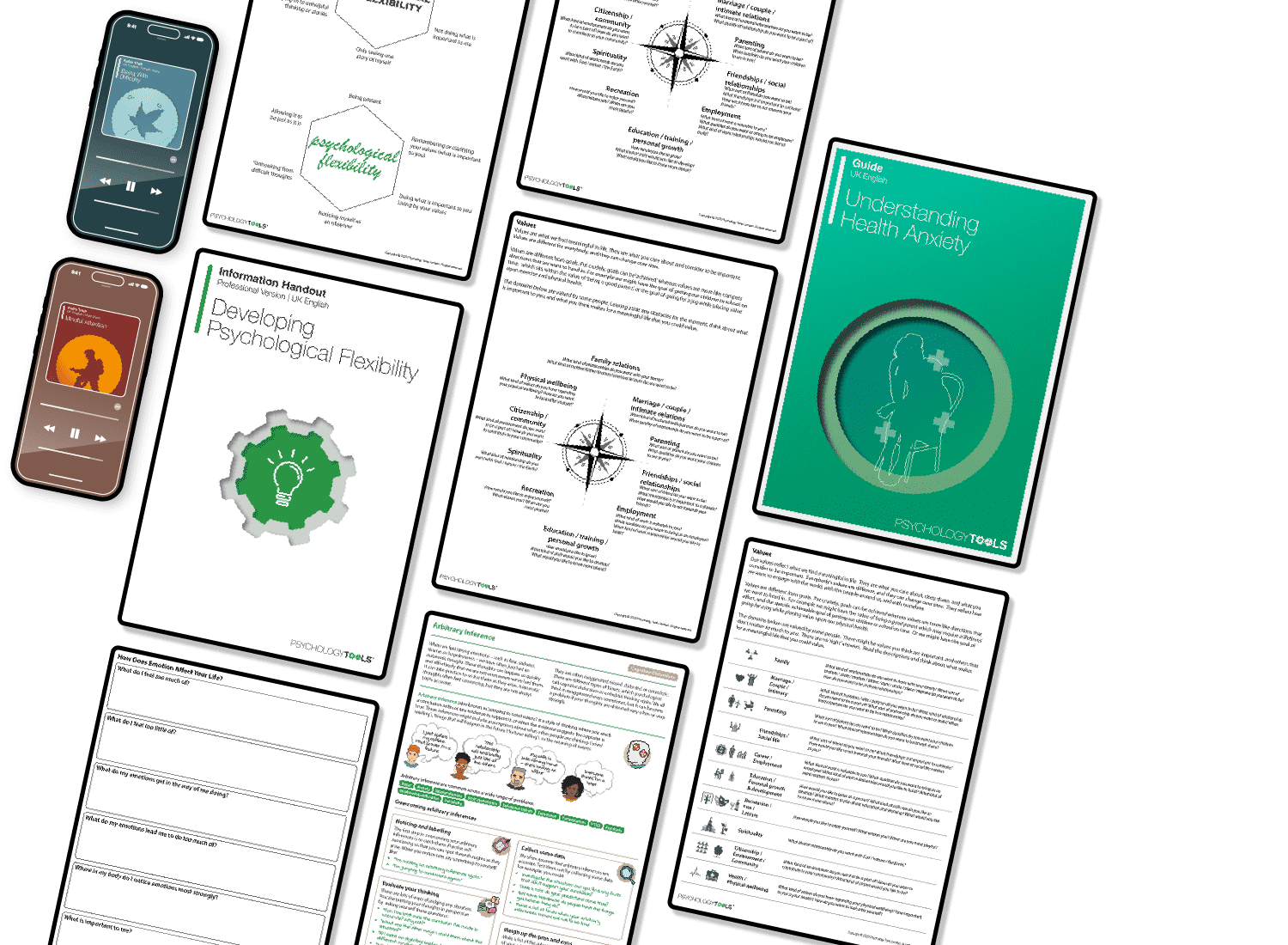Acceptance and Commitment Therapy (ACT)
Acceptance and Commitment Therapy (ACT) is one of the ‘third wave’ cognitive and behavioral therapies. It incorporates acceptance and mindfulness strategies alongside change strategies, in recognition that change is not always possible or desirable. ACT is theoretically derived from relational frame theory (RFT) which is a behavior analytic account of the functional properties of human language. The ACT approach proposes that suffering and dysfunction arise from attempts to control or eliminate unwanted experiences. Attempts to control or avoid can lead to the paradoxical effect of greater suffering and a perception of loss of control of the focus for elimination. The aim of ACT is to increase psychological flexibility, which is defined as “contacting the present moment fully as a conscious human being, and based on what the situation affords, changing or persisting in behavior in the service of chosen values” (Hayes, Luoma, Bond, Masuda, & Lillis, 2006). Read more

22 of 22 resources
Values
Meaningful activity is value-driven. This ACT-informed worksheet explores the key domains of values and encourages clients to reflect upon what is imp ...
https://www.psychologytools.com/resource/values/
Effective Weight Loss: An Acceptance-Based Behavioral Approach: Clinician Guide
Effective Weight Control: An Acceptance-Based Behavioral Approach comes in two volumes. This page is for the Clinician Guide. Click here to ...
https://www.psychologytools.com/resource/effective-weight-loss-an-acceptance-based-behavioral-approach-clinician-guide/
Values: Connecting To What Matters
Values: Connecting To What Matters is a practical self-help guide which introduces the reader to a cornerstone of acceptance and commitment therapy (A ...
https://www.psychologytools.com/resource/values-connecting-to-what-matters-full-guide/
Valued Domains
Values are the “principles for living” that capture what matters most to people. Elucidating values can serve many therapeutic functions, such as ...
https://www.psychologytools.com/resource/valued-domains/
The Coping Long Term With Active Suicide Program (CLASP): A Multi-Modal Intervention For Suicide Prevention: Clinician Guide
The Coping Long Term With Active Suicide Program (CLASP) comes in one volume – a Clinician Guide only.The Coping Long Term with Active Sui ...
https://www.psychologytools.com/resource/the-coping-long-term-with-active-suicide-program-clasp-a-multi-modal-intervention-for-suicide-prevention-clinician-guide/
Choosing Your Values
Values are the “principles for living” that capture what matters most to people. Elucidating values can serve many therapeutic functions, includin ...
https://www.psychologytools.com/resource/choosing-your-values/
Unforgiveness – The Hook
Everyone experiences hurts and transgressions. When an offence occurs, people often react with anger, fear, or sadness. When these responses persist, ...
https://www.psychologytools.com/resource/unforgiveness-the-hook/
Exploring Valued Domains
Values are the “principles for living” that capture what matters most to people. Elucidating values can serve many therapeutic functions, such as ...
https://www.psychologytools.com/resource/exploring-valued-domains/
What Is Mindfulness?
Mindfulness meditation is a traditional Buddhist practice. It is now commonly taught as a practice helpful in the management of a variety of mental he ...
https://www.psychologytools.com/resource/what-is-mindfulness/
[Free Guide] An Introduction To Values
People’s lives feel unfulfilling or directionless if they’re not guided by values. An Introduction to Values is a practical self-help guide design ...
https://www.psychologytools.com/resource/an-introduction-to-values/
Developing Psychological Flexibility
Acceptance and Commitment Therapy (ACT) proposes that suffering is associated with psychological inflexibility. ACT suggests that to increase psycholo ...
https://www.psychologytools.com/resource/developing-psychological-flexibility/
How Does Emotion Affect Your Life?
Emotions are an essential part of being human. Everyone experiences a wide variety of emotions in response to changes in their thoughts, biology, and ...
https://www.psychologytools.com/resource/how-does-emotion-affect-your-life/
A Guide To Emotions (Psychology Tools For Living Well)
Cognitive behavioral therapy can help your clients to live happier and more fulfilling lives. Psychology Tools for Living Well is a self-help course ...
https://www.psychologytools.com/resource/a-guide-to-emotions-psychology-tools-for-living-well/
Body Scan (Audio)
The Body Scan is a mindfulness exercise encouraging present-moment awareness, with the sensations of the body being used as an anchor for mindful atte ...
https://www.psychologytools.com/resource/body-scan-audio/
Mindfulness Of Breath (Short Version) (Audio)
Mindfulness Of Breath (Short version) is a mindfulness exercise encouraging present-moment awareness, using the breath as an anchor for the attention. ...
https://www.psychologytools.com/resource/mindfulness-of-breath-short-version-audio/
Being With Difficulty (Audio)
Being With Difficulty is a mindfulness exercise which gently brings present-moment awareness to bear upon thoughts and feelings that are more difficul ...
https://www.psychologytools.com/resource/being-with-difficulty-audio/
Mindfulness In Everyday Life (Audio)
Mindfulness In Everyday Life is a short mindfulness exercise which guides clients how to bring present-moment awareness into everyday life. This audio ...
https://www.psychologytools.com/resource/mindfulness-in-everyday-life-audio/
Mindfulness Of Breath (Long Version) (Audio)
Mindfulness Of Breath (Long version) is a mindfulness exercise encouraging present-moment awareness, using the breath as an anchor for the attention. ...
https://www.psychologytools.com/resource/mindfulness-of-breath-long-version-audio/
Mindfulness Of Sounds And Thoughts (Audio)
Mindfulness Of Sounds And Thoughts is a mindfulness practice exercise that encourages relating to thoughts as ‘just thoughts’ that come and go in ...
https://www.psychologytools.com/resource/mindfulness-of-sounds-and-thoughts-audio/
Mindful Attention (Audio)
The Mindful Attention exercise is an audio track from the Psychology Tools For Overcoming PTSD Audio Collection. This audio track was originally recor ...
https://www.psychologytools.com/resource/mindful-attention-audio/
Thinking Versus Sensing (Audio)
Thinking Versus Sensing is a short mindfulness exercise to demonstrate the difference between thinking about our experience and sensing it directly. E ...
https://www.psychologytools.com/resource/thinking-versus-sensing-audio/
Raisin Exercise (Audio)
The Raisin Exercise is a short mindfulness exercise encouraging present-moment awareness of the senses, connecting with taste, touch and smell while y ...
https://www.psychologytools.com/resource/raisin-exercise-audio/
Links to external resources
Psychology Tools makes every effort to check external links and review their content. However, we are not responsible for the quality or content of external links and cannot guarantee that these links will work all of the time.
Assessment
- Valued Living Questionnaire (Version 2) | Wilson, Groom | 2002
Case Conceptualization / Case Formulation
- A quick guide to ACT case conceptualization | Russ Harris | 2009
- Outline of ACT assessment / case formulation process | Jason Luoma
- ACT simple case formulation | Julian McNally
- Outline of ACT assessment / case formulation process
- ACT case formulation template adapted for clients with visible differences
- The brief case conceptualization worksheet
- Person-in-the-hole metahphor
- Passengers-on-the-bus metaphor
- Sailing boat metaphor from David Gillanders page of contextualscience.org
- ACT case formulation sheet | David Gillanders
Guides and workbooks
- Pre-empting your mind: practical tips for ACT therapists | Russ Harris
Information Handouts
- ACT handouts | Russ Harris | 2007
Information (Professional)
- Acceptance and commitment therapy in the treatment of chronic pain | Dahl, Lundgren
- Compendium Of Acceptance And Commitment Therapy Metaphors | Colleen Ehrnstrom | 2011
Presentations
- Mastering the metaphor | Colleen Ehrnstrom | 2011
- Session with IMPACT | Russ Harris (2014)
- Advanced ACT workshop | Russ Harris (2017)
Self-Help Programmes
-
6 ACT conversations
| RMIT University | 2006
- 1. Language creates conflict
- 2. Action & experience versus thought & emotion
- 3. Acceptance, willingness and inclusion
- 4. Mindfulness & being present
- 5. Your values & direction
- 6. Committed action
Treatment Guide
- ACT for OCD | Michael Twohig | 2004
- ACT in the treatment of chronic pain | JoAnn Dahl & Thomas Lundgren
- ACT for chronic pain | Lance McCracken | 2015
- ACT for diabetes self-management | Gregg, Hayes & Callaghan
- Mindfulness and acceptance-based group therapy for social anxiety disorder: a treatment manual | Fleming, Kocovski | 2009
Video
- The Struggle Switch | Russ Harris
- The Three Main Parts Of Your Brain | Russ Harris
- The Limbic Brain And Its Role In Trauma | Russ Harris
- The 3 Happiness Myths | Russ Harris
- The Stageshow Metaphor | Russ Harris
- The Values-Focused vs The Goals-Focused Life | Russ Harris
- The Unwelcome Party Guest – An Acceptance & Commitment Therapy (ACT) Metaphor | Joe Oliver
-
Learning ACT: An Acceptance And Commitment Therapy Skills Training Manual
| Luoma, Hayes, Walser | 2007
- Part 1: Introduction
- Part 2: Developing Acceptance/Willingness
- Part 3: Undermining Cognitive Fusion
- Part 4: Getting In Contact With The Present Moment
- Part 5: Distinguishing Conceptualized Self From Self-As-Context
- Part 6: Defining Valued Directions
- Part 7: Building Patterns Of Committed Action
- Part 8: The ACT Therapeutic Stance
- Part 9: Bringing It All Together
- Animation: Demons on the Boat metaphor – which outlines how an alternative, more accepting stance towards difficult thoughts, emotions or sensations can facilitate action towards values YouTube
Worksheets
- Worksheets from the Happiness Trap including Values, Defusion, and Experiential Avoidance exercises | Russ Harris | 2008
Recommended Reading
- Cullen, C. (2008). Acceptance and Commitment Therapy (ACT): A third-wave behaviour therapy. Behavioural and Cognitive Psychotherapy, 36(6), 667
- Harris, R. (2006). Embracing your demons: An overview of acceptance and commitment therapy. Psychotherapy in Australia, 12(4), 2-8
- Hayes, S. C., Pistorello, J., & Levin, M. E. (2012). Acceptance and commitment therapy as a unified model of behavior change. The Counseling Psychologist, 40(7), 976-1002
- Larmar, S., Wiatrowski, S., & Lewis-Driver, S. (2014). Acceptance & Commitment Therapy: An Overview of Techniques and Applications. Journal of Service Science and Management, 7(3), 216
What Is Acceptance And Commitment Therapy?
ACT Processes
Luoma, Hayes, and Walser (2007) describe some of the assumptions made by the ACT approach:
- Acceptance is the active and aware embrace of private events that are occasioned by our history, without unnecessary attempts to change their frequency or form, especially when doing so would cause psychological harm.
- Defusion is theprocess of creating non-literal contexts in which language can be seen as an active, ongoing, and relational process that is historical in nature and present in the current context.
- Self-as-context is a continuous and secure ‘I’ from which events are experienced, but which is also distinct from those events.
- Contact with the present moment is an ongoing, nonjudgmental contact with psychological and environmental events as they occur.
- Values are verbally constructed, global, desired, and chosen life directions.Values are what truly matter to us and are distinct from goals in that they cannot be ‘achieved’ butrather ‘moved toward or away from.’
- Committed action is the step-by-step process of acting to create a whole life, one of integrity, which is true to one’s deepest wishes and longings.
References
- Hayes, S. C., Luoma, J. B., Bond, F. W., Masuda, A., & Lillis, J. (2006). Acceptance and commitment therapy: Model, processes and outcomes. Behaviour Research and Therapy, 44(1), 1–25.
- Luoma, J. B., Hayes, S. C., & Walser, R. D. (2007). Learning ACT: An acceptance & commitment therapy skills-training manual for therapists. Oakland, CA: New Harbinger.









![[Free Guide] An Introduction To Values](https://media-engine-production-public.s3.eu-west-2.amazonaws.com/28518/conversions/%2A-an_introduction_to_values_en-gb_Guides_Cover-preview.jpg)











